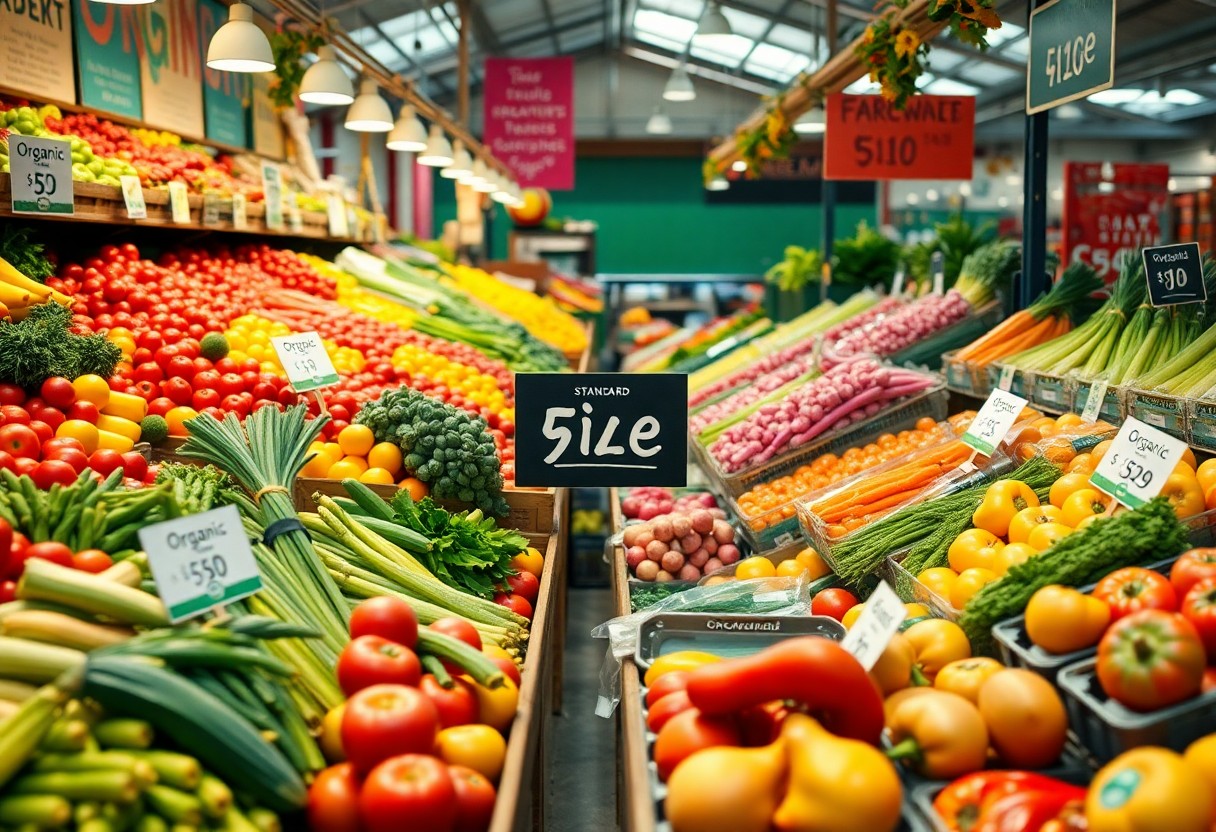Many consumers grapple with the choice between organic and conventional products. You might wonder if the higher prices of organic options are truly justified or if you’re merely paying for a label. This post will explore into the real differences between these farming practices, examining factors like health benefits, environmental impact, and safety measures, so you can make an informed decision that aligns with your values and budget.
Understanding Organic Products
Organic products offer a unique approach to food production, focusing on ecological balance, biodiversity, and sustainability. Unlike conventional farming, organic practices avoid synthetic fertilizers and pesticides, leading to a more natural growing process. This means you often gain access to fresher, pesticide-free options. For a deeper probe whether the extra cost for organic food is justified, you can check out Organic Food is Worth the Extra Money, Here’s Why.
Definition and Certification
Organic certification ensures that products meet specific standards set by regulatory bodies. To be labeled organic, food must be grown and processed without the use of synthetic chemicals, GMOs, and artificial additives. These standards are enforced through rigorous inspections, making certified organic products a reliable choice for health-conscious consumers.
Nutritional Differences
Notably, organic foods can differ from conventional ones in nutritional content. Studies show that organic produce may contain higher levels of antioxidants and vital vitamins. Certain research suggests that organic dairy and meat products showcase better omega-3 fatty acids due to the animals’ grass-fed diets, impacting overall health positively.
Research indicates that organic fruits and vegetables often boast higher antioxidant levels, which can enhance your overall nutrition. A 2014 study suggested that organic tomatoes had up to 30% more vitamin C than conventionally grown versions. Organic dairy entering the market usually comes from cows that are pasture-raised, which aids in increasing beneficial omega-3 fatty acids. These nutritional advantages illustrate that when you choose organic, you might be opting for more healthful food alternatives.
The Environmental Impact
Analyzing the environmental impact of organic versus conventional farming reveals significant differences in practices and outcomes. Organic farming emphasizes sustainability, utilizing natural methods that enhance soil health and reduce pollution. In contrast, Conventional Vs. Organic: Is It Worth It? highlights how conventional methods often rely on synthetic fertilizers and pesticides, which can lead to soil degradation and water contamination. Your purchasing decisions can influence these environmental repercussions profoundly.
Soil Health and Biodiversity
Organic farming techniques bolster soil health by focusing on crop rotation, composting, and cover cropping, which enhance nutrient availability and prevent erosion. You increase biodiversity by supporting organic practices that promote natural ecosystems, encouraging beneficial insects and microorganisms vital for soil vitality. Conventional practices, which often prioritize yield and efficiency, tend to deplete soil quality over time.
Carbon Footprint and Sustainability
The carbon footprint of agricultural practices plays a substantial role in sustainability assessments. Organic farms generally exhibit a lower carbon footprint due to reduced chemical inputs and practices that sequester carbon in the soil. In terms of sustainability, cultivating organic crops can lead to long-term environmental stability. For instance, a study found that organic farming could reduce greenhouse gas emissions by up to 30% compared to conventional methods. By choosing organic, you contribute to a more sustainable way of farming that aligns with ecological preservation goals.

Health Considerations
Evaluating health considerations in the organic versus conventional debate involves understanding the potential implications of pesticide exposure and the nutritional differences between these food sources. The choices you make can influence not only your health but also environmental sustainability.
Pesticide Residue and Human Health
Conventional farming often employs synthetic pesticides, which may leave residues on produce consumed by you. Research shows that certain pesticides are linked to health concerns, including hormonal disruptions and cancer risks. Although residues on food can be minimal, consistently consuming conventional products increases your exposure over time.
Organic vs Conventional Nutritional Benefits
Some studies suggest that organic foods may have enhanced nutritional profiles, particularly in antioxidants and important vitamins. Evidence indicates that certain organic fruits and vegetables contain higher levels of these beneficial compounds, which can positively impact your health.
Organic foods often boast higher levels of beneficial compounds, such as polyphenols and vitamin C, primarily due to the farming methods used. A study published in the journal *Nutrients* reveals that organic produce can have up to 60% more antioxidants compared to its conventional counterparts. This increase not only supports your immune system but may also reduce inflammation, offering additional health benefits. Furthermore, opting for organic dairy and meats ensures that you are consuming products free from hormone treatments and antibiotic residues, enhancing your overall well-being.

Economic Factors
Understanding the economic factors associated with organic and conventional products can significantly influence your purchasing decisions. The price disparity often stems from different production methods, subsidies, and labor costs. While organic farming may require more manual labor and stringent regulations, conventional products benefit from large-scale efficiencies. Ultimately, evaluating your budget and willingness to invest is key.
- Production methods
- Subsidies
- Labor costs
- Budget
The value you place on organic products often reflects your priorities and lifestyle choices.
Cost Analysis of Organic vs Conventional
Conducting a cost analysis between organic and conventional products highlights the significant differences in pricing. Organic items can be up to 50% more expensive than their conventional counterparts due to higher production standards and limited supply. However, this price may be justified if you prioritize health benefits and environmental sustainability.
Market Demand and Consumer Trends
Market demand for organic products has seen consistent growth as consumers become increasingly aware of health benefits and environmentally friendly practices. A recent study showed that about 75% of households are purchasing organic products regularly, indicating a significant shift in buying habits. This trend is also influencing retailers, leading to a broader selection of organic food items.
Consumers are increasingly leaning towards organic options due to heightened awareness around food safety and nutritional value. This demand drives more retailers to expand organic offerings, making these products more accessible. Younger generations, particularly millennials and Gen Z, prioritize transparency in sourcing and are willing to pay a premium for organic goods. The combination of health consciousness and environmental concern fuels this trend, ultimately reshaping the food market landscape.

Taste and Quality
Taste and quality in the organic vs. conventional debate often hinge on personal preference and the farming practices behind the products. Organic items are frequently praised for their freshness, attributed to local sourcing, and the absence of synthetic chemicals, which some claim enhances flavor. Conversely, conventional produce may offer consistency and availability, but can sometimes lag in flavor depth, especially when mass-produced and transported long distances.
Flavor Profiles
Flavor profiles of organic and conventional foods can differ significantly, influenced by cultivation methods. Organic fruits and vegetables tend to exhibit more vibrant and complex flavors. This is partially due to the lack of synthetic fertilizers that can sometimes dilute natural flavors. Studies indicate you might find organic strawberries up to 20% sweeter compared to their conventional counterparts, offering a richer tasting experience.
Consumer Preferences
Consumer preferences play a pivotal role in the perception of taste and quality. Many shoppers express a strong preference for organic products, believing they offer superior taste and overall quality. Surveys show that around 60% of consumers associate organic foods with better flavor, connecting them to a fresher, more authentic eating experience.
Despite the appeal of organic options, individual preferences can vary dramatically based on factors like upbringing, culinary exposure, and even regional availability. The notion that organic equals better taste frequently emerges from anecdotal experiences, yet it lacks definitive scientific backing in all cases. Some consumers prioritize affordability or accessibility over perceived quality and might choose conventional products without sacrificing their enjoyment of flavor. Exploring local farmers’ markets or seasonal offerings can also enhance your ability to discern preferences beyond the organic label.
Accessibility and Availability
Accessing organic products can often be more challenging than conventional options, largely due to their specific production and distribution requirements. Organic farming tends to have a lower output per acre, which can lead to limited quantities available on store shelves. In many areas, especially rural regions, the variety of organic options may be minimal compared to conventional goods, posing a dilemma for consumers seeking healthier choices.
Distribution Challenges
Distribution poses a significant hurdle for organic products, primarily because of the need for specialized logistics to maintain product integrity. Many retailers struggle with the short shelf life of organic produce, which leads to increased costs in storage and transportation. As a result, these challenges can inflate prices, making organic options less accessible for the average consumer.
Regional Variations in Organic Supply
The availability of organic products varies significantly based on location. Urban areas often boast a diverse range of organic options in supermarkets and specialty stores, whereas rural regions may lack robust supply chains. Regional climatic conditions and the prevalence of local farms influence the type and quantity of organic products available, affecting your ability to choose organic over conventional.
In the Midwest, for example, organic corn and soybean farming is prominent, leading to a greater availability of these products in nearby markets. In contrast, regions with harsher climates or limited agricultural infrastructure might struggle to provide a consistent supply of organic vegetables or fruits. Local farmers’ markets play a pivotal role in bridging this gap, but without access or awareness, you may find yourself relying on conventional options even when they’re not your preferred choice. Ultimately, understanding your local organic supply can empower you to make informed decisions about your food purchases.
Final Words
Upon reflecting, it’s clear that the choice between organic and conventional products should be guided by your personal values, budget, and specific circumstances. While organic foods may offer benefits in certain areas, such as reduced pesticide exposure and environmental impact, conventional options often present a more accessible choice without significant compromises in quality. You should assess what matters most in your diet. For insights on prioritizing your grocery choices, check out I’m a Dietitian & I Don’t Usually Buy Organic—Here’s Why.
FAQ
Q: What are the main differences between organic and conventional farming methods?
A: Organic farming focuses on natural processes and inputs, prohibiting synthetic pesticides and fertilizers, while conventional farming often utilizes these chemicals to enhance productivity. Organic practices also emphasize biodiversity, soil health, and sustainability.
Q: Are organic foods significantly healthier than conventional foods?
A: Research shows mixed results; organic foods may have higher antioxidant levels and lower pesticide residues, but overall health benefits can vary. A balanced diet rich in vegetables and fruits, whether organic or conventional, is vital for health.
Q: Is it worth paying more for organic products?
A: The worth of organic products depends on factors such as environmental impact, pesticide exposure, and personal values. If sustainability and reduced chemical exposure are priorities for you, investing in organic may be justified.
Q: How does organic farming affect the environment compared to conventional farming?
A: Organic farming tends to promote biodiversity, reduce pollution through limited chemical use, and enhance soil health. Conventional farming may contribute to soil degradation and harmful runoff, impacting ecosystems and water quality.
Q: Are there specific products where organic is more beneficial?
A: Certain products, particularly those with thin skins or high pesticide usage like berries, spinach, and apples, tend to benefit more from organic farming. Choosing organic for these items can reduce pesticide exposure significantly.